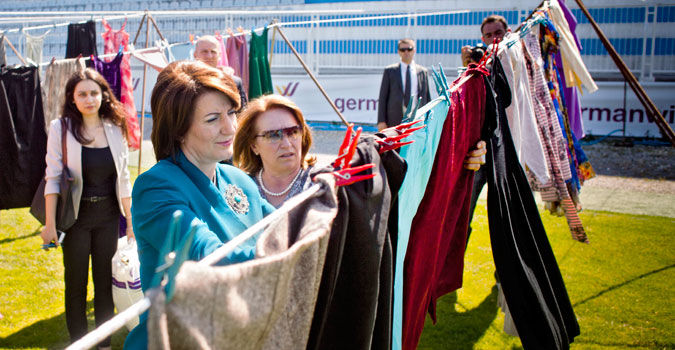Ending violence against women

A violation of fundamental human rights that has grave physical, sexual and psychological consequences, violence against women and girls in Kosovo is common.
More than 15 years after hostilities ceased in 1999, survivors of conflict-related sexual violence remain stigmatized, and a culture of shame and silence surrounds the issue. Recently, significant progress has been achieved in this field and in March 2014 the Kosovo Assembly approved Law No. 04/L-172, which legally recognizes victims of sexual violence during the armed conflict in Kosovo.
In a 2008 survey, 46 per cent of women said they’d suffered domestic violence at least once; men commit 91 per cent of all domestic violence cases. Although the Law on Protection against Domestic Violence and the National Programme on Protection against Domestic Violence are fairly comprehensive, implementation is a challenge. There are shelters for women and children who have suffered gender-based violence, but both shelters and rehabilitation and reintegration services are sorely under-funded.
UN Women in Action in Kosovo
Preventing gender-based violence and domestic violence against women and girls is a high priority for UN Women in Kosovo.
- As part of the UN Kosovo Team Joint Programme on Domestic Violence, UN Women has supported the establishment of Coordination Mechanisms to protect women against domestic violence in three pilot municipalities –Gjilan/Gnjilane, Gjakova/Djakovica, and Dragash/š. These centres provide support services to domestic violence survivors. UN Women has also supported the development of Domestic Violence Strategies and Action Plans by municipalities, which include a budget commitment by mayors. The program was recently extended to March 2017 and covers 4 municipalities in northern Kosovo – Mitrovicё/a North, Zveҫan/Zvečan, Zubin Potok, and Leposaviq/ć.
- To improve law enforcement responses to domestic violence survivors, Kosovo police officers underwent training developed by UN Women to prioritize domestic violence cases. Working with the Kosovo Judicial Institute, judges in three municipalities were trained on property rights, domestic violence, procedure and International women’s human rights instruments.
- UN Women trained civil society organization members of the coordination mechanisms on participatory local level processes and budget planning. They were provided gender-responsive budgeting advocacy tools so that municipal planning and budgets could effectively fund and address local government domestic violence initiatives.
- UN Women in partnership with the Kosovo Judicial Institute organized two trainings to investigate, prosecute and adjudicate international crimes with elements of sexual violence. The first three-day training was for Kosovo and EULEX judges, prosecutors, criminal investigators and legal officers with professional experience in sexual war crimes. The second training focused on civil society representatives, police investigators and members of the National Council for the Survivors of Sexual Violence during the War, human rights officers, representatives of foreign embassies and others.